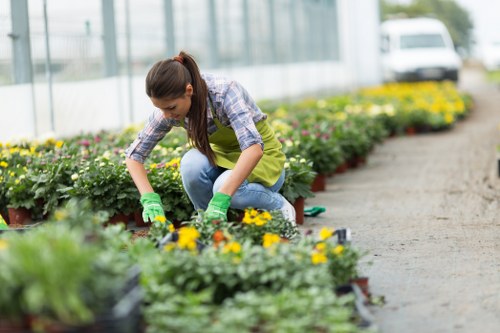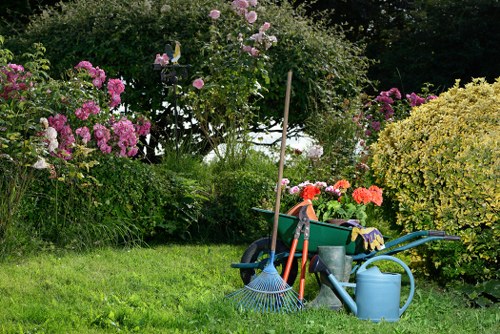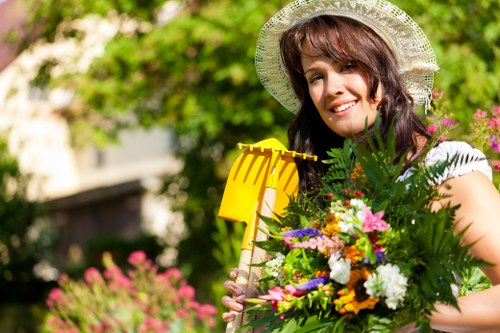Comprehensive Guide to Garden Maintenance in Mitcham

Introduction to Garden Maintenance
Maintaining a beautiful garden in Mitcham requires a blend of knowledge, dedication, and the right tools. Whether you're a seasoned gardener or a beginner, understanding the fundamentals of garden maintenance in Mitcham can transform your outdoor space into a vibrant and thriving sanctuary.
From seasonal planting to regular upkeep, each aspect plays a crucial role in the health and aesthetics of your garden. This guide will walk you through essential maintenance tasks to ensure your garden remains lush and attractive all year round.
Emphasizing sustainable practices and leveraging local resources can make garden maintenance more manageable and environmentally friendly. Let’s delve into the key components that will help you achieve garden perfection in Mitcham.

Seasonal Garden Care
Spring Maintenance
Spring is the perfect time to rejuvenate your garden. Start by clearing out any debris that accumulated over the winter months. Pruning dead branches and trimming overgrown plants encourage new growth and improve plant health.
Planting spring bulbs and annuals can add vibrant colors to your garden. Additionally, preparing your soil by adding compost or organic matter enhances fertility, providing essential nutrients for your plants.
Irrigation systems may need adjustment after the winter. Ensure that hoses and sprinklers are free from damage and functioning efficiently to support your garden's new growth.

Summer Maintenance
Summer maintenance focuses on keeping your garden hydrated and managing the intense heat. Regular watering is crucial, especially during dry spells. Mulching around plants helps retain moisture and suppress weeds.
Pest control becomes a priority as insects and other pests thrive in warmer temperatures. Implementing natural pest repellents and encouraging beneficial insects can maintain a balanced ecosystem.
Pruning is still necessary in the summer to promote air circulation and reduce the risk of fungal diseases. Deadheading spent flowers encourages continuous blooming and keeps your garden looking its best.

Autumn Maintenance
Autumn is a time for preparing your garden for the colder months. Begin by removing fallen leaves and debris to prevent mold and pests from taking hold.
Planting autumn flowers and perennials ensures your garden remains colorful as the weather cools. It's also an ideal time to divide and transplant overcrowded plants, giving them space to grow in the next season.
Protecting tender plants with mulch or covers can safeguard them against frost. Additionally, maintaining your garden tools and equipment ensures they are ready for use when spring arrives.

Winter Maintenance
While colder temperatures may slow down plant growth, winter maintenance is still essential. Protecting sensitive plants with frost blankets or burlap can prevent damage from frost and freeze.
Regularly check for pests hiding in your garden beds and take necessary actions to manage them. Cleaning and storing garden tools properly during the winter prolongs their lifespan and ensures they're in good condition for the next year.
Planning for the upcoming gardening season can be done in winter. Assess what worked well in your garden and what needs improvement. Sketching out garden layouts and selecting new plants can give you a head start once the weather warms up.
Lawn Care Tips
A well-maintained lawn is the foundation of any beautiful garden. Regular mowing, watering, and fertilizing are key to keeping your grass healthy and vibrant.
- Mowing: Keep your grass at an optimal height to encourage strong roots and prevent weed growth.
- Watering: Deep, infrequent watering promotes deep root systems and drought resistance.
- Fertilizing: Use appropriate fertilizers to provide essential nutrients tailored to your lawn's needs.
Additionally, aerating your lawn annually helps improve soil structure and nutrient absorption, ensuring your grass remains lush and resilient.
Pruning and Trimming
Proper pruning and trimming are vital for maintaining the shape and health of your plants. Regular pruning removes dead or diseased branches, promotes airflow, and encourages new growth.
When pruning, always use sharp and clean tools to make precise cuts. Understand the specific needs of each plant species to avoid over-pruning or damaging them.
- Identify branches that need removal.
- Make clean cuts at the appropriate angle.
- Dispose of pruned material properly to prevent disease spread.
Trimming hedges and shrubs helps maintain their desired shape and prevents them from becoming unruly, enhancing the overall appearance of your garden.
Pest and Disease Management
Managing pests and diseases is a critical aspect of garden maintenance in Mitcham. Early detection and prompt action can prevent minor issues from becoming significant problems.
Implementing integrated pest management (IPM) strategies, such as introducing beneficial insects and using organic pesticides, can effectively control pest populations without harming the environment.
- Regular inspections: Check plants regularly for signs of pests or disease.
- Proper sanitation: Remove diseased plant material to reduce the spread of pathogens.
- Healthy practices: Maintain plant health through proper watering, fertilizing, and pruning.
By adopting these practices, you can maintain a healthy garden ecosystem that naturally resists pests and diseases.
Soil Management
Healthy soil is the foundation of a thriving garden. Regular soil testing helps determine nutrient levels and pH balance, allowing you to amend the soil accordingly.
Incorporating organic matter, such as compost or well-rotted manure, improves soil structure, enhances nutrient content, and promotes beneficial microbial activity.
Proper mulching not only conserves moisture but also regulates soil temperature and suppresses weed growth, contributing to overall soil health.
Plant Selection and Planting
Choosing the right plants for your garden in Mitcham is essential for successful maintenance. Select species that are well-suited to the local climate, soil conditions, and sunlight availability.
Diversifying your plant selection can improve garden resilience and reduce the risk of widespread pest and disease issues. Incorporate a mix of perennials, annuals, shrubs, and trees to create a balanced and aesthetically pleasing garden.
- Native plants: They are adapted to the local environment and require less maintenance.
- Seasonal flowers: Ensure continuous blooms and color throughout the year.
- Drought-tolerant species: Ideal for reducing water usage during dry periods.
Proper planting techniques, such as correct depth and spacing, are critical for plant establishment and growth.
Irrigation Systems
An efficient irrigation system is crucial for maintaining a healthy garden. Automated systems can provide consistent watering, saving time and ensuring plants receive adequate moisture.
Drip irrigation and soaker hoses are effective methods for delivering water directly to the plant roots, minimizing water waste and reducing the risk of fungal diseases.
- Scheduling: Set watering schedules based on weather conditions and plant needs.
- Maintenance: Regularly check for leaks or blockages to ensure optimal performance.
- Adjustments: Modify watering patterns as seasons change to accommodate varying moisture requirements.
Incorporating rainwater harvesting systems can further enhance sustainability by utilizing natural water sources for your garden.
Garden Tools and Equipment
Having the right tools is essential for effective garden maintenance. Quality equipment not only makes tasks easier but also contributes to better results.
Essential tools for garden maintenance in Mitcham include:
- Pruning shears and loppers for trimming plants.
- A sturdy lawnmower for maintaining your grass.
- Garden forks and spades for soil management.
Regularly clean and store your tools properly to extend their lifespan and ensure they are always ready for use. Investing in ergonomic tools can also reduce physical strain and improve your gardening experience.
Composting and Waste Management
Composting is a sustainable practice that recycles organic waste into valuable fertilizer for your garden. It reduces the amount of waste sent to landfills and enriches your soil with essential nutrients.
Set up a compost bin in your garden and regularly add kitchen scraps, garden clippings, and other organic materials. Ensure proper aeration and moisture levels to facilitate the decomposition process.
- Choose a suitable location for your compost bin.
- Add a balanced mix of green and brown materials.
- Turn the compost regularly to promote aeration.
Using compost in your garden improves soil structure, enhances water retention, and promotes healthy plant growth.
Hardscape Maintenance
Maintaining the hardscape elements of your garden, such as pathways, patios, and fences, is important for both functionality and aesthetics.
Regular cleaning and repairs prevent deterioration and ensure these structures remain safe and attractive. Consider sealing stone surfaces to protect against weathering and staining.
- Pathways: Keep walkways clear of debris and repair any cracks or uneven areas.
- Patios: Sweep regularly and power wash to remove dirt and mold.
- Fences: Inspect for damage and apply protective finishes as needed.
Integrating hardscape maintenance with your overall garden care routine creates a cohesive and well-maintained outdoor space.
Eco-Friendly Gardening Practices
Adopting eco-friendly gardening practices not only benefits the environment but also enhances the sustainability of your garden. Implementing these practices can lead to healthier plants and a more resilient garden ecosystem.
Some eco-friendly strategies include:
- Using organic fertilizers: Reduce chemical usage and improve soil health.
- Water conservation: Implement efficient irrigation systems and rainwater harvesting.
- Promoting biodiversity: Plant a variety of species to support beneficial insects and wildlife.
Incorporating these practices into your garden maintenance routine fosters a harmonious relationship between your garden and the natural world.
Professional Garden Maintenance Services
While DIY garden maintenance can be rewarding, enlisting professional garden maintenance services in Mitcham can provide expertise and save you time. Professionals offer comprehensive services, including landscaping, regular upkeep, and specialized care for complex gardening needs.
Benefits of hiring professionals include:
- Access to expert knowledge and advanced techniques.
- Time-saving, allowing you to focus on other priorities.
- Customized maintenance plans tailored to your garden’s specific requirements.
Consider partnering with a reputable garden maintenance company to ensure your garden remains in pristine condition throughout the year.
Conclusion
Effective garden maintenance in Mitcham involves a combination of regular care, strategic planning, and sustainable practices. By understanding the unique needs of your garden and implementing these maintenance strategies, you can create a beautiful and thriving outdoor space.
Whether you choose to maintain your garden yourself or hire professionals, consistency and attention to detail are key to achieving lasting results.
Contact us today to learn more about our garden maintenance services and start transforming your garden into a picturesque haven.